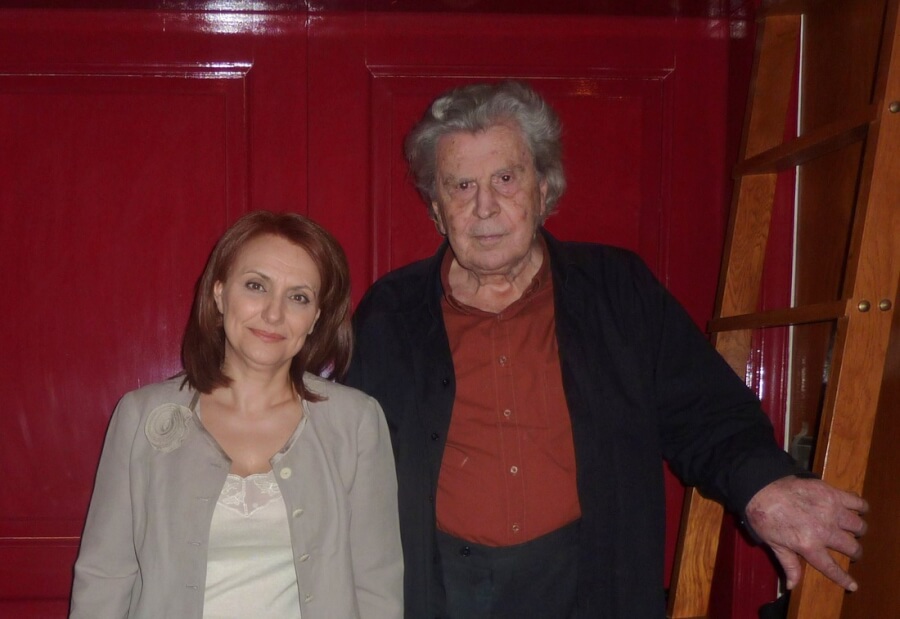Brendan Behan's play "A Homer", by Brendan Behan, is presented this season in the theater car at "Train on the Roof", translated by Vassilis Rota and Voulas Damianakou, directed by Tatiana Lygaris and music by Mikis Theodorakis.
Brendan Bean is one of the most important Irish writers of the last century. Watching the show, I realized that it is a well-crafted and well-crafted production, with excellent performances by the actors, who also perform the songs live, in their own way and without betraying Theodorakis' classic melodies. I was also impressed by the special and innovative multi-purpose "Train on the Roof"...
The music of the work was composed by Mikis Theodorakis in 1962 for the first presentation of the work in Greece by the Leonidas Trivizas troupe. Since then, nine other performances of the play followed in Greece and Cyprus with the same music. In the program of the performance the composer notes:
Many times I happened to compose some music almost "forcibly", I would say involuntarily, due to financial or other pressure and in the end it turned out to be a "station" in the whole of my work. One such case is the music I wrote for the play "One Homer". In 1961, I was in Athens for some audition, in a hurry as always, because I had commitments in Europe, when Achilleas Mamakis, theater critic in "Ethnos" called me and begged to see me urgently. In his office I met Leonidas Trivizas, a young director at the time, whom Mr. Mamakis introduced to me with the best words and suggested that I write music for a play he was going to stage at the newly built "Circular Theatre". At first, naturally, I refused because I was indeed very busy. Finally I agreed to take the text with the promise that if I found some time, I would write the music.Flying to Paris, I read the work on the plane, which made a great impression on me. When I arrived, I immediately sat down at the piano, and it seems that the content inspired me so much that I began to compose one song after another, and so within an hour I wrote all the music, but without the impression that this music would be completely separate page within my entire work.
The value of this music was first appreciated by Trivizas and the actors who performed the songs flawlessly, and so it was decided to record two songs ("The laughing child" and "Open a little window" with the protagonist Dora Giannakopoulou), which to the surprise of all of us, it immediately had a very wide appeal. So the company decided to make a disc of all the music. But the censors forbade the release of the record because of the line "From the bastards of the foreigners, my dear, hide your mess", which I refused to remove. So the first public performance was done in what I would call an amateur way: I sang all the songs myself on the piano and the tapes were distributed free of charge. Much later, the first recording took place with me again in the role of performer, while on the eve of the dictatorship we had also finished the second version with Maria Faradouri as performer.
The plot of the play, which largely referred to our own historical experiences, gave the play - beyond any aesthetic value - a political dimension, given that at that time we were living through important events such as the murder of Grigoris Lambrakis, which opened a new page in Greek history and thus "The Laughing Child" we can say that at that time it became an anthem of the rebellious youth.
The peak of the project's success came with the film "Z" by Costas Gavras, which gave it an international dimension. As for its musical importance within the whole of my work, I would say that its particularity comes from the fact that its reference to another country with another culture, led me to a particular musical writing, in my attempt to render as much as possible more the Irish character without distancing myself from the Greekness of my musical writing.
As for my own opinion of this play, I consider it to be one of the most lyrical and tender plays I have written, and for that reason I am particularly happy that it will be staged by The Train on the Roof under the direction of Tatianas Lygari and indeed at a time when our endurance as a Nation and as a People is being tested.
For this new presentation of the play, the troupe asked me to put music to two more songs whose lyrics were included in the play until now but not set to music and which complete the play, while at the same time uniting two different eras. I had the opportunity to watch a rehearsal and I must say that I was impressed by the musicality of the artists and also by the new perception of the interpretation of the songs.
I thank them all and wish them every success.
Mikis Theodorakis
Especially for this show l




